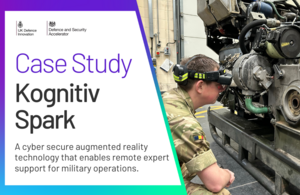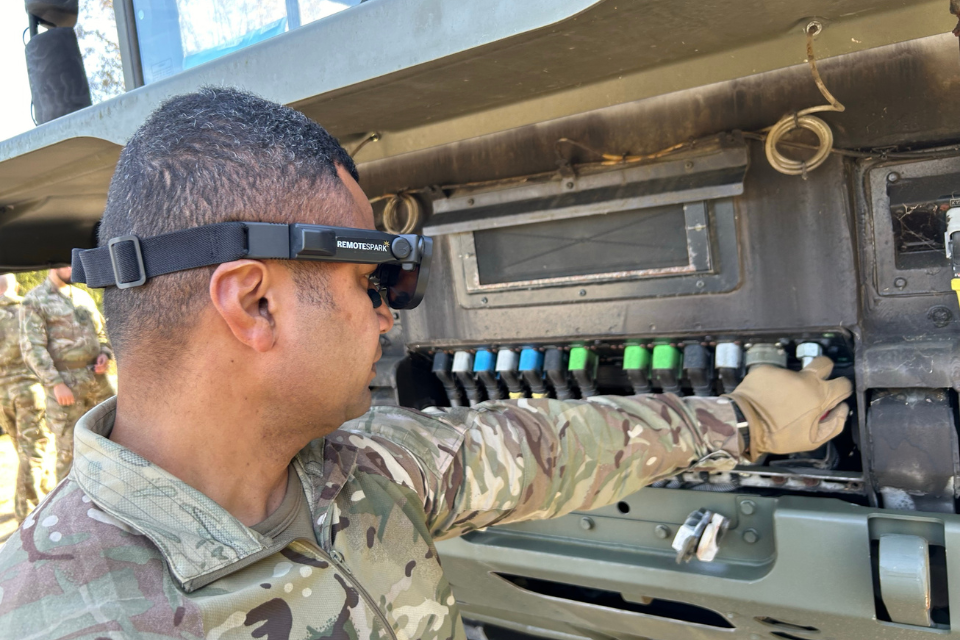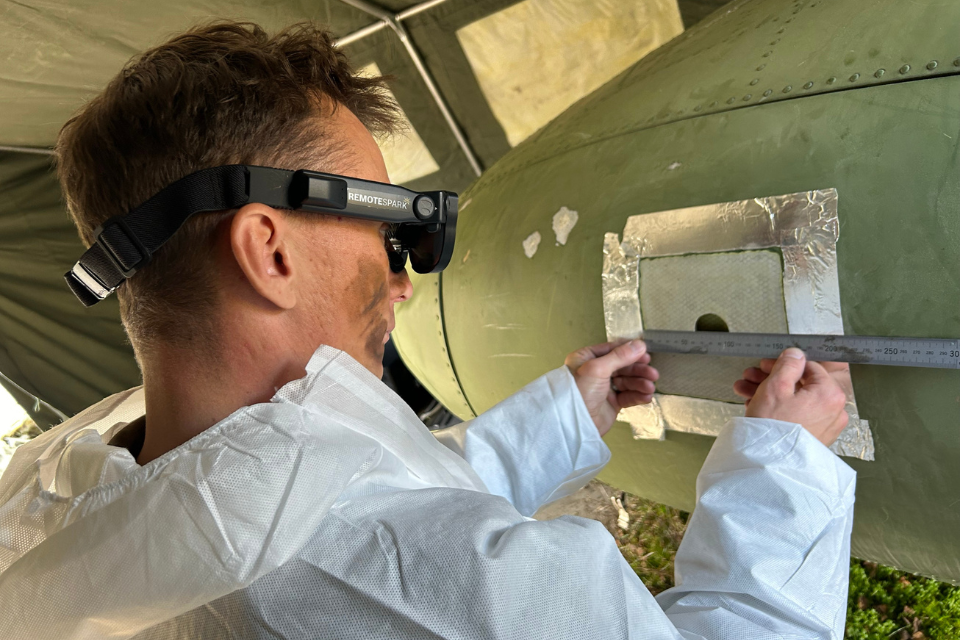Kognitiv Spark: Secure Augmented Reality for Defence Operations
With UKDI-DASA funding, Kognitiv Spark deployed a cyber secure augmented reality technology that enables remote expert support for military operations

- The Defence and Security Accelerator, part of UK Defence Innovation (UKDI-DASA), funded Kognitiv Spark through the DTEP programme to deploy their augmented reality remote support solution on secure defence infrastructure.
- The technology enables users out in the field, such as technicians and engineers, to connect with remote experts worldwide using AR headsets, sharing real-time audio-visual feeds and PDF documents, capturing photos with annotations.
- UKDI-DASA funding helped catalyse partnerships with major defence organisations including Rheinmetall MAN Military Vehicles (RMMV), Rheinmetall BAE Systems Land (RBSL) and MSI Defence Systems, and follow-on Army Innovation projects exploring AR as a core military capability.
Augmented Reality for Defence
Picture this scenario: A military technician in Estonia is working on a critical piece of equipment that’s malfunctioning. The specialist with the expertise to fix it is 1,000 miles away in the UK. In the past, this could mean costly delays, expensive travel, or potentially mission-critical equipment remaining offline for days.
Now, with Kognitiv Spark’s augmented reality solution, RemoteSpark, the technician can put on an augmented reality headset and instantly connect with a remote expert. The specialist can see exactly what the technician sees, annotate their shared view in real-time, overlay diagrams, and guide them through the repair step-by-step—all whilst maintaining military-grade security. In a scenario such as this, the equipment can be back online within hours rather than weeks.
This is just one use case that Kognitiv Spark, a small technology company, has created for defence operations worldwide with UKDI-DASA funding support.
Introducing Kognitiv Spark
Kognitiv Spark was founded in 2016 with a clear mission: to enhance worker capabilities through augmented reality remote support, without replacing human expertise. The company, now employing 25 people across the UK, US and Canada, specialises in connecting field workers with remote experts using heads-up, hands-free AR technology.
What sets Kognitiv Spark apart is their “cybersecurity and defence at heart” approach. Adam Clay, Managing Director, UK & EMEA, Kognitiv Spark explains: “Our co-founder Ryan Groom started a cybersecurity company that ended up specialising in augmented reality. Coming from that genesis meant the core product has always been agnostic to network and able to have adaptability to work within the constraints of certain networks.”
This foundation proved crucial for defence applications, where security requirements are paramount.
From concept to deployment with UKDI-DASA support
Kognitiv Spark’s relationship with UKDI-DASA began through the Defence Technology Exploitation Programme (DTEP) in 2022. The SME understood that the AR space had matured, and support for defence uses was growing with the potential to address challenges within the support chain and to help deliver operational efficiencies.
“The DTEP project was twofold,” explains Clay. “In addition to developing the technology, it was also about exposing secure AR to more users across the services and exploring use cases, whilst focusing on secure by design. If this is going to be adopted as a core capability in defence, it needs to adhere to MOD’s security requirements.”
Real-world impact: from workshops to battlefields
The AR technology can work across diverse environments – from workshops and power plants to military field operations. Using AR headsets or smart glasses, defence users can connect with experts anywhere in the world, sharing real-time video/audio feeds whilst simultaneously viewing technical documentation, schematics and receiving guidance from remote workers anywhere in the world.
Their AR solution offers real-time access to support and training, better utilising personnel and digital assets backed up by specialist advice, both deployed and across the Defence Support Network, enabling operational equipment to return to service more rapidly.
Crucially, the solution operates on low-bandwidth connectivity, making it viable in challenging operational environments where network capacity is limited.
Prior to their UKDI-DASA project, Kognitiv Spark had already conducted early work with individual army units, receiving positive feedback from user groups interested in the capabilities of AR and remote support.
However, UKDI-DASA funding enabled greater exposure across defence services, with traction in land and field army applications.
“We’ve been able to expose and receive feedback on our technology from a wide array of Army stakeholders. Not only has it given them time to understand the technology, but it’s also provided them with ideas on how it can be directly used and how to deploy it to solve their challenges,” explains Clay. “Additionally, for Kognitiv Spark, as a small organisation, being able to take on feedback and grow alongside the project has been hugely enabling.”
This exposure led to visibility with users and has generated significant commercial outcomes and partnerships with major defence original equipment manufacturers (OEMs) who recognised the same support challenges their military customers face.
Kognitiv Spark now works with Rheinmetall BAE Systems Land (RBSL), Rheinmetall MAN Military Vehicles (RMMV), and MSI Defence Systems amongst others, providing remote support capabilities that improve efficiency and knowledge sharing across their operations.

RemoteSpark enables remote expert support for military operations
DTEP: Combining the expertise of both defence primes and SMEs
The DTEP project enabled Kognitiv Spark to tackle their most significant technical challenge: deploying their SparkOps application on secure sovereign defence cloud infrastructure.
Working with their DTEP higher-tier supplier Serco, Kognitiv Spark was introduced to Prolinx, an SME specialising in secure sovereign cloud solutions for government and MOD.
“Prolinx had a replica sandbox environment of a MOD secure network and experience of the secure by design process,” notes Clay. “We’re now very proud to say that our system has deployed on secure sovereign defence cloud.”

RemoteSpark provides real-time audio-visual feeds, PDF document sharing, and the ability to capture photos with annotations.
Pioneering the future of military capability
The DTEP project catalysed two additional Army Innovation initiatives that Kognitiv Spark has completed in parallel. The first, ARPAI (Augmented Reality Pan Army Implementation Plan), examined army-level implementation of the AR tech. This work also led to PJ ESART (Project Equipment Support using Augmented Reality), which explores additional support applications.
The UKDI-DASA experience
“This was our first rodeo as an SME dealing with this sort of framework and funding,” reflects Clay. “It had an administration burden in terms of recording and reporting as would be expected for a project of this nature. But the support from our Project Monitoring Officer and others at UKDI-DASA and Dstl has been superb.”
“For innovation to succeed in defence, you need three things aligned: user demand, senior leaders who will champion it, and a sustained funding line. Without all three connected, even excellent projects hit a cliff edge and can’t continue.”
The UKDI-DASA funding allowed us to do this work and test out a theory. Nearly two years on, we’ve emerged and proved it can be done. Thanks to UKDI-DASA and the DTEP project, we’ve had greater exposure within MOD, greater usage within the defence supply chain, and deployment within an environment that MOD can use.
Dual-use innovation for UK defence and industry
Kognitiv Spark exemplifies how UKDI-DASA investment strengthens both defence capabilities and UK technology innovation. Their journey demonstrates how small, agile companies can develop transformative technologies when given strategic support to overcome technical and commercial barriers.
As the company continues developing relationships across the defence ecosystem and proving their technology’s value as potential core military capability, they represent the innovation goals UKDI-DASA funding is designed to nurture – turning great ideas into reality whilst building sustainable UK businesses.
Updates to this page
-
UKDI Tag added
-
First published.